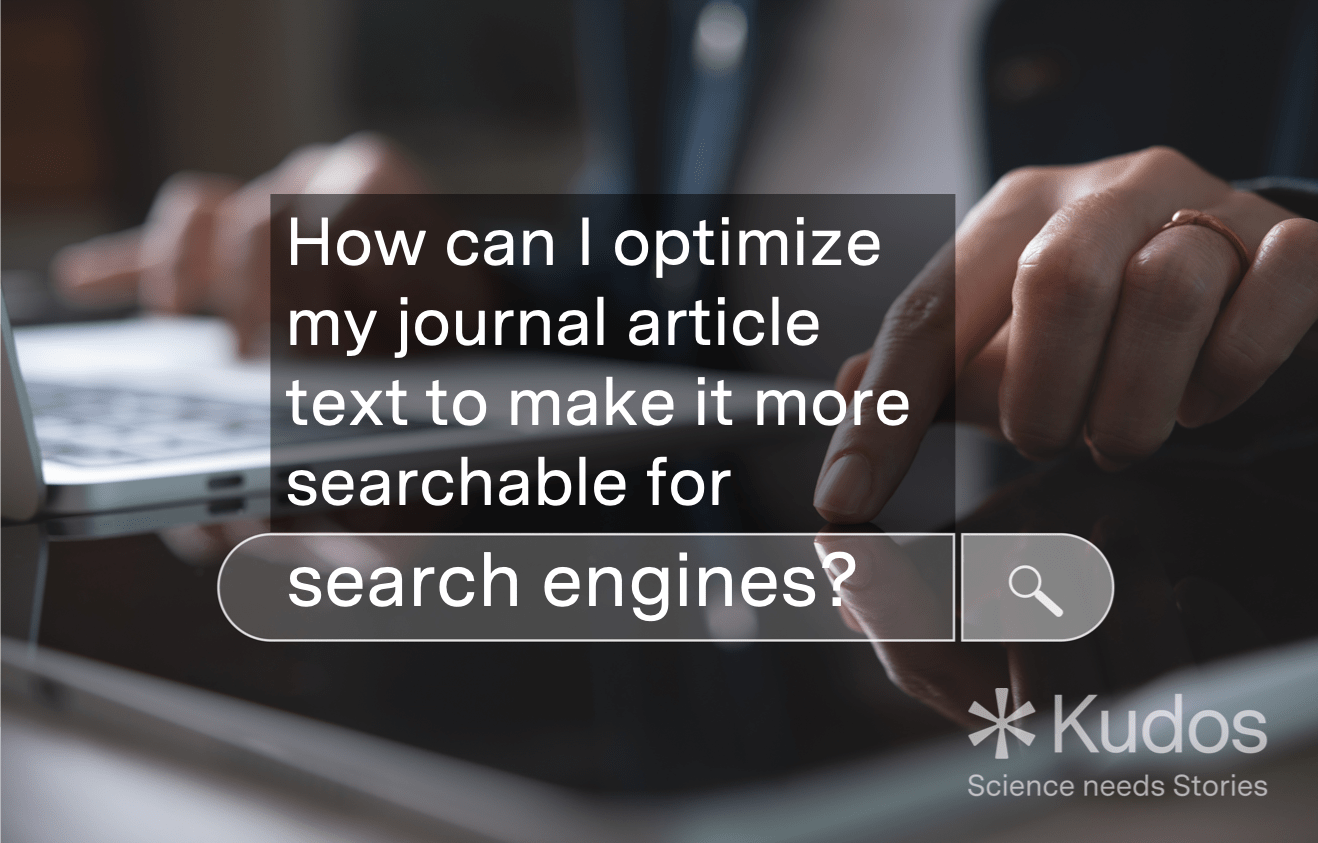This week, our blog posts are focusing on answering some of the questions that have come up during our recent webinars. Yesterday we looked at questions around tracking the impact of different types of research, and about how you can create impact in specific fields, or when you don’t have much budget. Today we’re doing a deep dive into things you can do to ensure your article ranks as highly as possible in search engine results.

Why optimize your article for search engines?
A high proportion of all readership of journals comes via search engines. It's estimated that 75% of people never look beyond the first page of search results. So if you want people to find your article, it can make sense to pay some attention to “search engine optimization” i.e. making an effort to help your article appear in the first page of search results. This comes down to:
- Well-pitched keywords
- A meaningful title
- A balanced abstract
- Consistent full text
- Promoting your article
Choosing keywords
Pitch your keywords at the right level – not too broad (you don’t need to include the field), nor too specific (e.g. stick to English – you don’t need to include Latin names). Think about your keywords as the words people are likely to use when running an internet search that you want to lead to your paper. What 2-4 words are they likely to use in searching for it? Have you included those words in your keyword list? You can research keywords using tools like Google Trends or see the terms people discuss on social media sites using hashtagify.me. You can also search for a keyword related to your article in Google, scroll to the bottom of the search results to see the list of similar searches Google recommends.
Writing an SEO-friendly title
Next think about your title. Titles are given the most “weight” by search engines because it is assumed they will contain all the most relevant words in terms of describing the entire page (or paper). Studies have suggested that shorter titles attract most citations; this could actually be because search engines like Google actively favour shorter page titles and so those papers have been returned higher in search results. Try to include a simple description of your research in your title, rather than a witty analogy or pun. You want your title to sound interesting, so people will click on it, but it must also be clearly relevant to what they are searching for.
- Journal titles are also used by Google to evaluate the relevance of results - it will often include in its results articles from journals that contain the keyword in their titles even if the specific articles do not. That *may* influence your choice of where to submit.
Writing a good abstract
When I talk about a “balanced” abstract, I mean that it should include your keywords – but not too many times. The “Goldilocks rule” says you should use your keywords “not too much, but not too little”. This likely means each one appearing 2–3 times in your abstract – search engines are sensitive to efforts to “trick” them and will downgrade content they think has been “keyword stuffed” – this means using keywords an unnatural number of times to make your article seem relevant to a search engine. Think about using keywords but also making your text clear, relevant and concise for the reader, as Google values positive user experience (UX).
Tips for writing the full text of your article
Finally, and perhaps most importantly, make sure that the “full text” of your article is consistent with your title, keywords and abstract. Even though the full text may often be “paywalled”, most publishers work with search engines to enable it to be “crawled” for their indexes so the language of the full text also has a role to play in SEO although not nearly as vital - prevalence of search terms in the full text doesn’t seem to have as much of an impact on the ranking as prevalence in e.g. abstract.
- Different image types have an impact on the findability of your work - the text in “vector” images (svg, ai, eps, pdf (not scans)) can be searched by search engines; the text in “raster” images (gifs, jpg, png) cannot. If you include images in your article, it’s a good idea to format them in a way that search engines can read.
Promoting your article
It is very important to work to promote your article so search engines can see that it is of value to readers. Links coming into your article, and a good amount of time spent on your article's page, are important signals for search engines. Google is looking for signs of E-E-A-T (Experience, Expertise, Authoritativeness and Trustworthiness) to recognize that your content is of high quality, relevant and worthy of a high position on the search results page. Adding a summary of your research to a platform like Kudos will help SEO efforts as Kudos’ site is already recognized as being authoritative and trustworthy. If someone mentions your work or interviews you, be sure to request that they include a link back to your Kudos page on their site to help Google recognize your page is valuable and being referenced elsewhere.
Thank you to all those who have attended our recent webinars, and for the great questions! You can view slides / recordings or sign up for our future webinars 
At Kudos we have spent 10 years helping researchers develop and broaden impact through better research communication. Get started now – you can register for free and then pick the tools and services you need.

![[AD] Tools and services to help develop your research impact – join free and get started today](https://no-cache.hubspot.com/cta/default/5642616/8361fdcf-9cea-4cbd-a62a-465612a6bb22.png)

